Please note that the information contained in this blog is for informational purposes and is not to be considered legal advice. This blog does not create or imply an attorney-client relationship. Satter Ruhlen Law Firm makes no representation that the information herein reflects the most current state of the law. This blog is not a substitute for consultation with an attorney licensed in your jurisdiction. If you would like to discuss your particular circumstances with us, please set up a consultation by contacting the Satter Ruhlen Law Firm at 315-471-0405 or through our website (https://www.satterlaw.com/contact-us/). We look forward to walking you through your workplace rights.
Blog
Meet Margaret!

Meet our Spring 2024 intern, Margaret Grinnell, who is a part of Professor Grant Reeher’s Political Science Internship course at Syracuse University. Margaret is in her final semester at Syracuse, studying International Relations, and is drawn to areas of civil law.
Margaret has had the opportunity to volunteer for the Central Virginia Legal Aid Society in her hometown of Charlottesville, Virginia. In this role, she completed paralegal work in the family law division, helping to support attorneys provide free legal assistance to low-income clients. At Syracuse, she completed a research assistantship with the Muslim Family Law Index Project, assessing legal reform in fifty-three countries. Through these experiences, Margaret gained a passion for legal accessibility and research.
At Satter Ruhlen Law Firm, Margaret is learning about the continuing evolution of labor law legislation, and is developing an interest in advocating for employee rights. She has observed depositions, interacted with clients, and participated in discussions of case law. Different from her previous experiences, at Satter Ruhlen, Margaret has gained a new perspective in the legal field, researching and learning about how employees and unions are protected under the law.
Margaret says her experience at Satter Ruhlen has given her clarity and confidence in her plans to move forward with a career in law. She notes, “Observing the diverse caseload at the firm has allowed me to understand different legal procedures which has enriched my legal understanding.”
We’ve certainly enjoyed having Margaret with us this semester, and we’re excited to watch her pursue a legal career!
Meet Hamere!

Satter Ruhlen Law Firm’s Fall 2023 intern is Hamere Debebe, who comes to us through Professor Grant Reeher’s Political Science Internship course at Syracuse University. Originally from Addis Abeba, Hamere is a Senior at SU, studying Political Science, and she is deeply engaged in understanding the complexities of the legal system and its societal impact.
This is not Hamere’s first experience working in the legal industry; at the Council of Europe in Strasbourg, France, she immersed herself in policy research and writing, focusing on issues affecting Roma and Travellers. In New York City, as a Youth Advocate at Harlem Youth Court, she gained practical insights into the juvenile justice system. These experiences have been crucial in shaping her understanding of legal processes at different levels.
At Satter Ruhlen Law Firm, Hamere’s enthusiasm for labor law, fueled by witnessing the benefits of unions in her family, has led her to explore the procedural aspects of legal work. She has delved into various legal activities, and found herself particularly drawn to arbitration cases. These cases, distinct from the trial cases she was accustomed to, offered her a richer perspective on alternative dispute resolution. “Seeing these cases unfold, especially after the intense clerical and research efforts, was incredibly fulfilling,” Hamere reflects. “The process of attorneys negotiating and presenting their cases via a neutral arbitrator, brought a new layer of understanding to legal negotiations and resolutions.”
Hamere states that internship with Satter Ruhlen Law Firm represents a significant milestone in her evolving legal career, especially as she prepares for law school. Her experiences at the firm have not only deepened her understanding of legal principles but also allowed her to explore new areas of law.
We’ve had a great time working with Hamere this semester!
Speaking Up On Behalf Of Your Coworkers
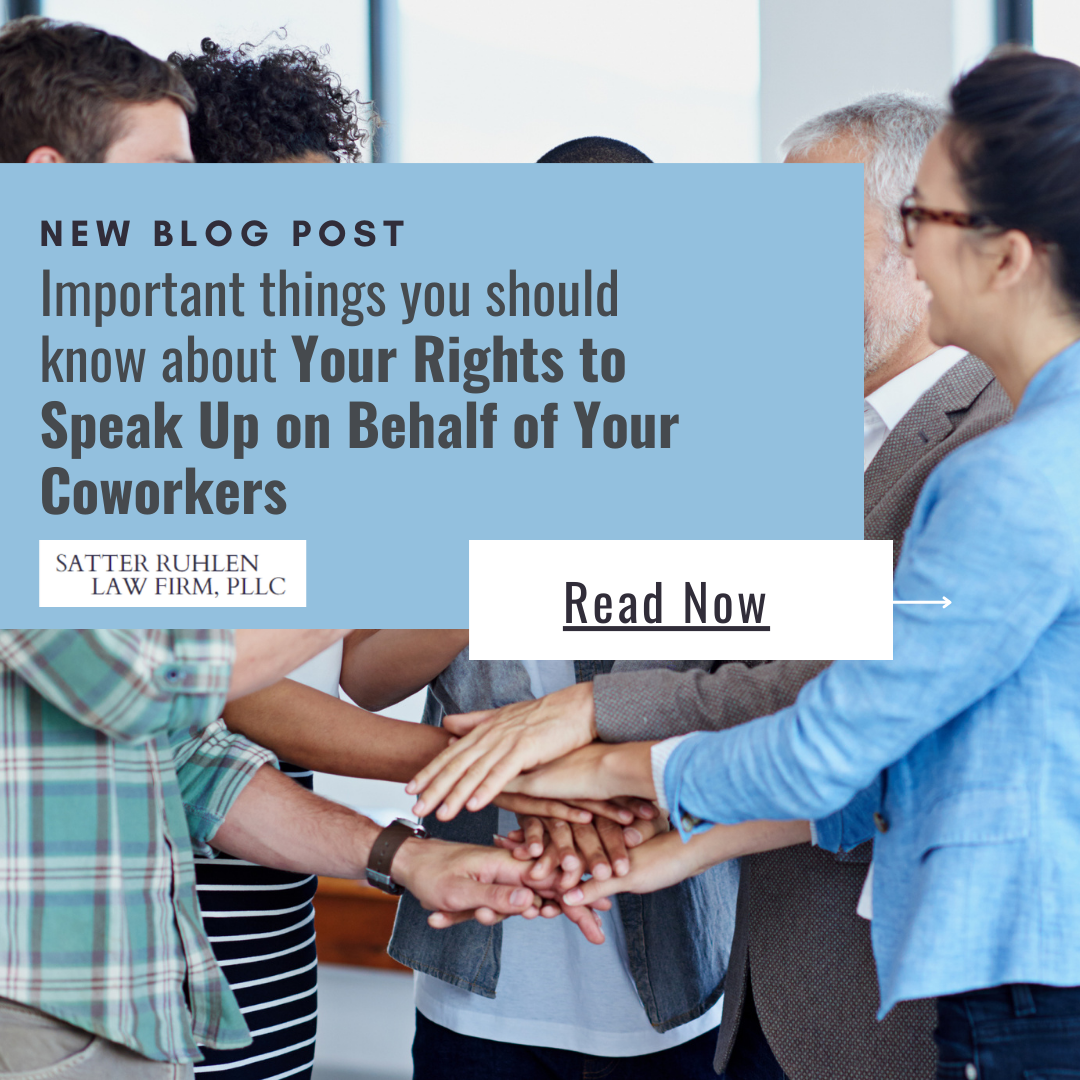
Your employer probably does not welcome your advocating for your colleagues. Whether your advocacy is protected or not depends on what you are discussing, how you say it, and how many other employees it involves.
This is an area of law that flip-flops every few years, so make sure you speak to a reputable workplace attorney!!!
A recent decision by the National Labor Relations Board has expanded the protections for your workplace discussions. It’s complicated, but you may have the right to talk with other employees or the boss about things like workplace safety, your wages, the schedule, or other terms and conditions of employment for the purposes of “mutual aid and protection.” “Mutual aid and protection” is one of those legal phrases that has a special meaning, so you’ll definitely need to speak with a lawyer to know whether a particular comment is protected. Generally speaking, if your comment to coworkers is intended to initiate or prepare for group action, or to bring group complaints to management’s attention, it may be protected.
Discussions that only involve your individual circumstances are not protected. And not every remark made in a group setting is protected. And even if your remark turns out to be protected, it may take months or years of litigation to ascertain that it was protected – during which time you are probably going to be looking for a job.
That said, Section 7 of the National Labor Relations Act gives many private-sector workers a federally-protected right to engage in protected concerted activity for the purposes of mutual aid and protection, and they don’t have to be in a union to exercise that right.
If your boss is on your case for a remark you made about a concern shared by your coworkers, talk to a workers’ rights attorney. It may turn out you have some protection.
Illegal Mandatory Overtime for New York Nurses
Imagine you’re an LPN working at a nursing home, and you haven’t had a day off in two weeks. The nursing home is short-staffed. Management says they’re trying to hire, but you don’t see them trying very hard. You need the job, so you keep on working. And working. And working. You need to take your child to the dentist, there is a mountain of laundry, and you really need to get snow tires. And you need a nap! But there’s no time, because they keep scheduling you for back-to-back shifts.
Now, imagine you’re coming to the end of yet another double. You put in for time off three weeks ago. You’re really looking forward to that nap!
Then the scheduler announces that you are being mandated for overtime. Your heart sinks. No time now for the dentist. No laundry, no snow tires. No nap! You have a feeling that something isn’t right, but you’re not sure who can do anything about it. What’s a nurse to do?
Good news: the New York State law on mandatory overtime for nurses has been amended. Employers are not allowed to require mandatory overtime for nurses except in emergency situations – defined as a health care disaster, a state of emergency, an unforeseen emergency that the employer could not plan for, or during a medical procedure where the nurse is needed. Note that emergency situations do not include chronic staffing shortages! This law applies to registered nurses (RNs) and licensed practical nurses (LPNs).
The amendment sets up civil penalties for violations, as well as requiring the employer to pay an additional 15% of overtime to the nurse. These penalties only kick in after the New York State Department of Labor completes an investigation and concludes that the law was violated. Nurses who believe that their employers are violating the mandatory overtime protections should speak with their union representative or a New York State workplace lawyer.
And then they should take a good long nap.
New York Warehouse Workers: Know Your Rights!
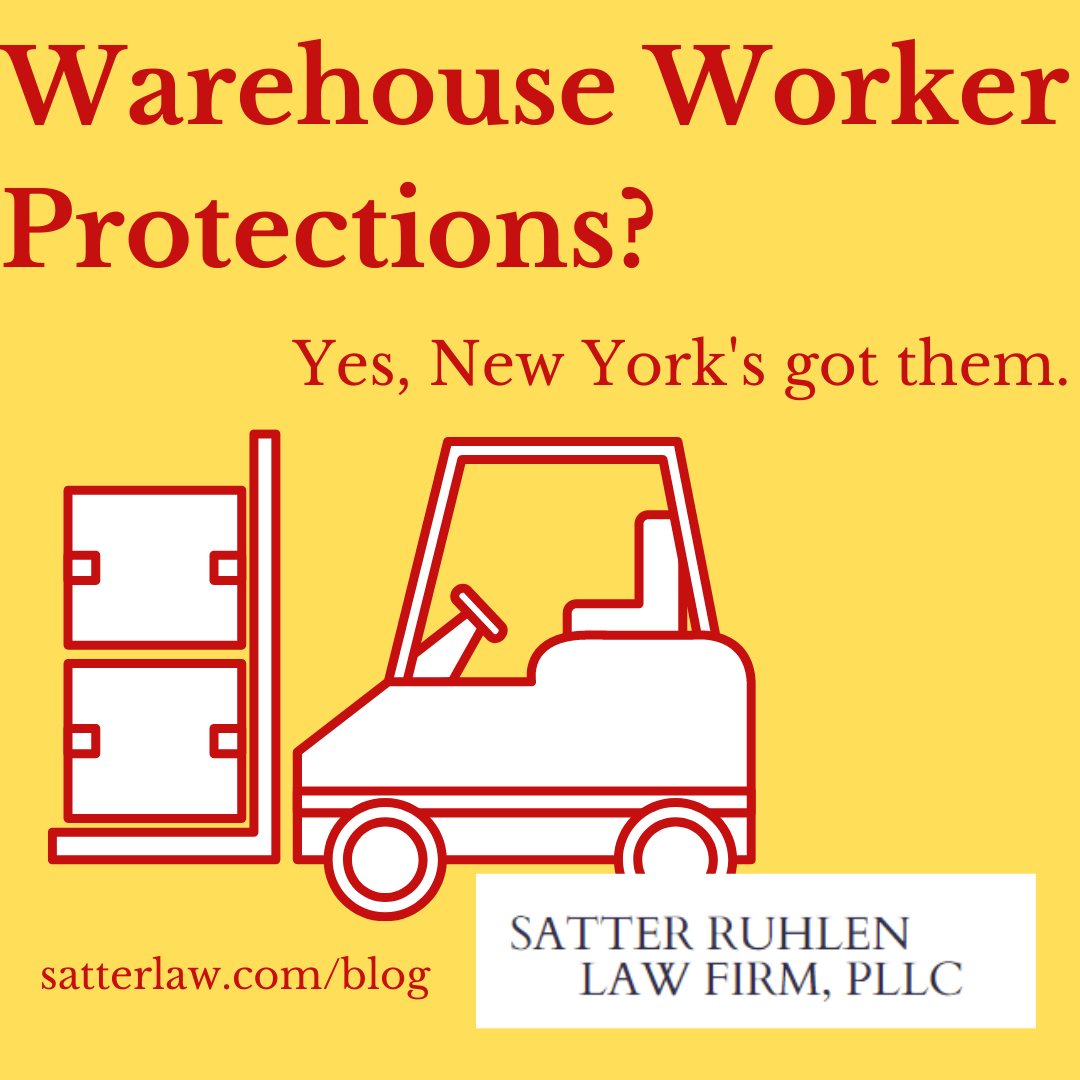
On June 19, Governor Kathy Hochul announced that legislation protecting warehouse workers from unreasonably demanding work quotas is now in effect. New York’s Warehouse Worker Protection Act (WWPA) requires employers to disclose work speed quotas, and protects employees from quotas that don’t include time for rest periods, bathroom breaks, and meals. The WWPA applies to employees at warehouses with more than 100 employees, or employees who work for employers who employ 500 or more employees at multiple warehouses.
Employers are required to provide a written description of quotas when workers are hired, as well as within two business days of a change in quota. It is illegal for employers to retaliate against employees for requesting quota information or filing a complaint. Workers can report violations to the New York State Department of Labor. There are also civil remedies available; individuals should speak with a reputable workplace attorney to determine how to pursue their rights.
If you work in a warehouse and you have questions about the WWPA, it’s a good idea to speak with your union representative or a New York lawyer.
Understanding the New York State Employment Relations Act (SERA) and Your Right to Organize
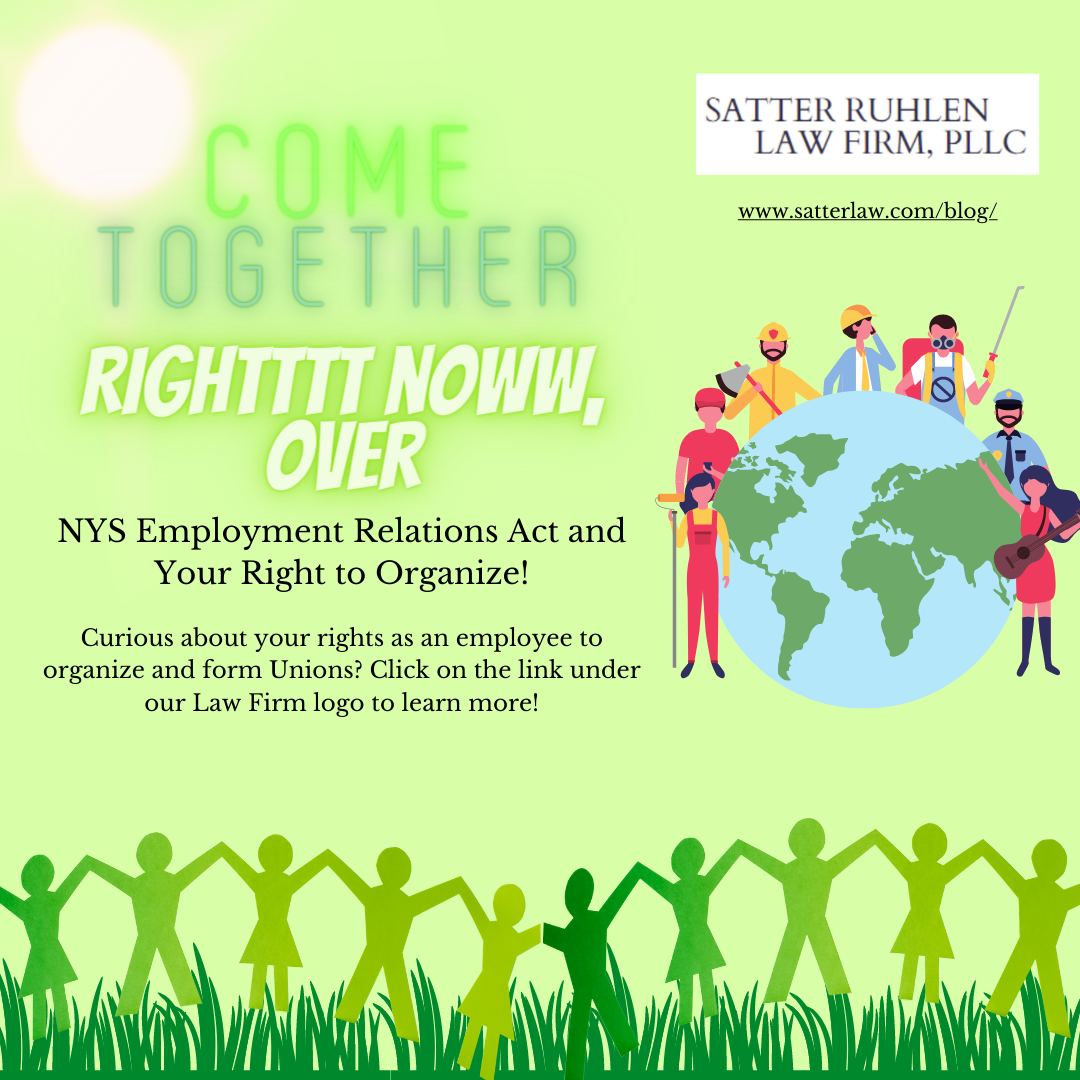
This is a guest post by our summer Peggy Browning Fellow, Jorge Salles Díaz. Jorge joined us from Vanderbilt University Law School.
As workers, it’s important to understand our rights and protections when it comes to organizing and forming unions. While the National Labor Relations Act (NLRA) provides federal protection for private sector employees, there are many exceptions. In New York, the New York State Employment Relations Act (SERA) fills in some of these gaps. Let’s take a closer look at what SERA means for workers’ rights in New York.
- Who is Covered by SERA:
Under the NLRA, employees are protected if their employer meets a certain monetary threshold. However, in New York, SERA extends protection to many employees whose employer does not meet the interstate commerce threshold set by the NLRA. This means that, even if a New York employer does not meet the monetary threshold, its employees may still have the right to organize and form a union under SERA.
- Protecting Agricultural Employees:
One notable difference between the NLRA and SERA is the protection of agricultural employees. While the NLRA excludes them from its coverage, SERA extends protection to agricultural employees in New York.
- Domestic Employees and Independent Contractors:
Unfortunately, neither the NLRA nor SERA provides specific protection for domestic employees. This means that individuals working in private households, such as nannies or housekeepers, may not have the same rights to organize and form unions. Likewise, neither the NLRA nor SERA protect independent contractors.[1]
- Differences in Labor Organization Rights:
The NLRA includes a section that outlines unfair labor practices by labor organizations, prohibiting activities such as establishing closed shops and engaging in secondary boycotts. However, SERA does not have a provision addressing unfair labor practices by labor organizations.
Conclusion:
Understanding the New York State Employment Relations Act (SERA) is crucial for workers in New York who are interested in organizing and forming unions. While the NLRA excludes many workers from federal protection, SERA fills in some of the gaps and extends coverage to employees who may not be protected under the federal law. New York workers may have the ability to organize and advocate for fair workplace treatment even if they are not covered by the NLRA. If you’re wondering whether SERA applies to your workplace, getting good advice from a reputable labor law attorney is essential.
[1] On a practical level, it’s essential to understand that employers sometimes misclassify employees as independent contractors to avoid providing benefits and protections. If you suspect that you may have been misclassified, it is advisable to consult with an employment lawyer in your jurisdiction.
My employer is trashing me! What are my rights?
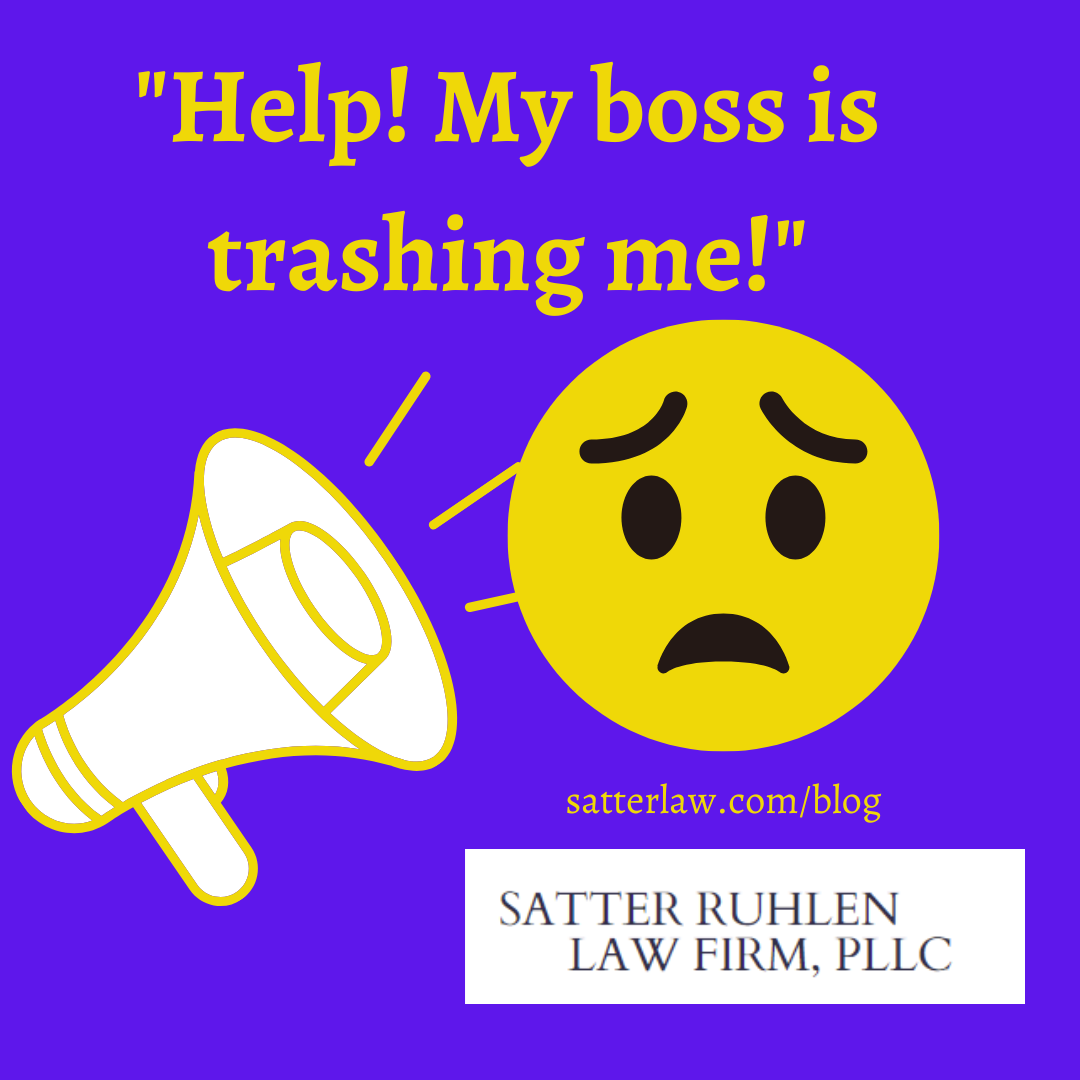
Bosses sometimes say terrible things about workers. And those statements can have consequences for an employee’s livelihood.
Warning! A real defamation claim is much more nuanced and complicated than any blog, TikTok, or Instagram post can convey. Defamation is a common law claim which varies from state to state. Make sure you speak with a reputable workplace attorney in your jurisdiction about your specific situation.
To be truly defamatory, a statement must be 1) false, 2) published, 3) intentional, and 4) cause monetary damage.
- In order to be defamatory a statement has to be a falsehood. So, if the boss is telling people that you are constantly late, and you are in fact constantly late, that’s not defamation. On the other hand, if you can prove that the statements about your tardiness are false, that is one element of defamation.
- In addition to being a falsehood, the statement has to be “publicized” which means the employer has to share the false comment with someone else. If the false comment occurs during a phone conversation or in a meeting, unless you have witnesses who are willing to back you up, you might have a hard time proving it. But if the employer writes it down and then sends it to other people, then it might be easier to prove publication.
- Intent means the employer meant, or recklessly disregarded the possibility, that the statement would be false. This is a tough element, as no one can crawl into the boss’s head to understand what they were actually thinking. But if there’s some plausible indication that there was a malicious motive behind the statement, that might help with the “intent” element.
- Finally, you have to show monetary harm, which means showing a causal connection between your inability to get another job and the employer’s comments. This is the hardest element, as employers may have multiple reasons for not hiring particular person—which may or may not include false statements made by the prior employer. Sometimes employees hire private investigators to find out what former employers are saying during reference calls. That information, while expensive, can establish a causal connection.
Employers have several defenses to a charge of defamation. For example, most statements made during evaluations, employee counseling, grievance proceedings, and disciplinary proceedings are privileged, meaning even if they are false, the employer is allowed to make them. Additionally, statements made during legal proceedings are absolutely privileged. Moreover, opinions are not defamatory, so if the boss precedes the false comment with the words “in my opinion” then it’s going to be harder to prove defamation. And if you consent to the employer making a statement, then the employer is allowed to make the statement without being accused of defamation.
If you go through the above analysis and decide you want to try to pursue a claim, the next step is to go to an attorney. It’s important to make sure you feel comfortable with the attorney and understand, up front, the amount of time and money you might be required to spend to pursue the matter. The attorney will help you determine how strong the claim is, what kind of damages you might be looking at, and what options you have.
When the boss is truly besmirching your name, it’s worth the fee to speak with a reputable workplace attorney in your state.
Noncompetes, nondisparagements, and NDAs, oh my!
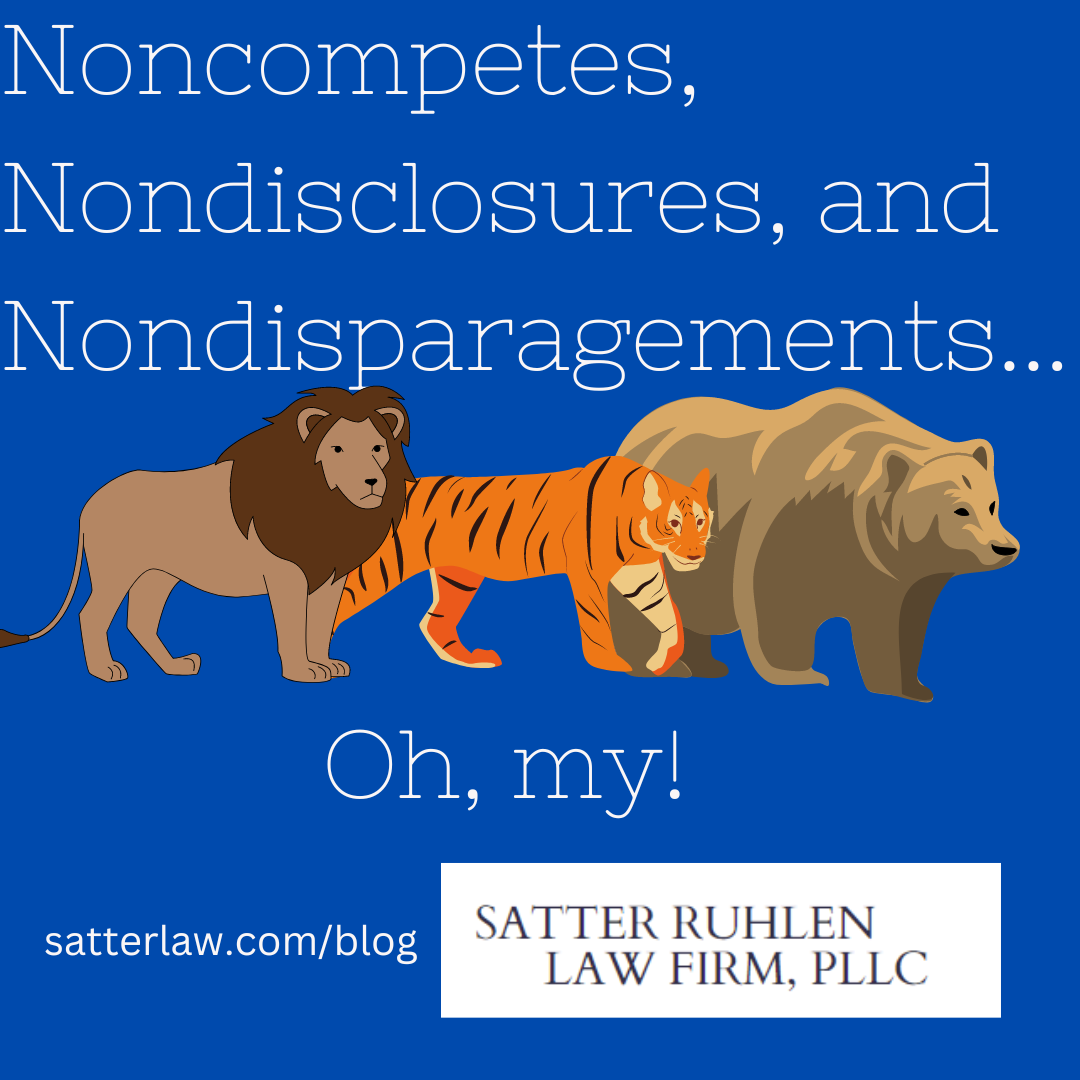
You may have been hearing a lot recently about “noncompetes,” “nondisparagement,” and “NDAs” (or “confidentiality”) agreements. [1] These are three types of restrictive covenants. Restrictive covenants are rules that employers impose on employees both during and after employment. The effects of restrictive covenants range from slightly annoying to totally unfair restriction on an employee’s ability to make a living.
Several states, including New York, are on the brink of passing legislation banning noncompete clauses – talk to a lawyer in your state to find out whether you have state protections against those clauses.
Additionally, the Federal Trade Commission (FTC) is in the process of creating a rule that would ban noncompete clauses. The Chamber of Commerce and other employer backed organizations are protesting the rule and even threatening to sue the FTC even though the notice and comment period is still open. The FTC considers noncompete clauses (not surprisingly) impediments to competition, and wants to ban them because they “block workers from freely switching jobs, depriving them of higher wages and better working conditions, and depriving business of a talent pool that they need to build and expand,” says FTC Chair Lina Khan.
Recently, the National Labor Relations board (NLRB) ruled that some types of confidentiality and nondisparagement provisions interfere with former employees’ Section 7 rights. Confidentiality agreements could prevent former employees from discussing terms and conditions of work, such as wages. Those types of discussions are essential for union organizing. Likewise, nondisparagement clauses could prevent former employees from having important conversations with each other about unsafe or unfair working conditions, which are also protected by the National Labor Relations Act.[2]
Employees should always consult with their union representative or a workplace attorney when they are presented with anything that the employer wants them to sign. But with the law changing how employers can use non competes confidentiality and non disparagement clauses, it’s more important than ever to get good legal advice. Always consult with an attorney before signing an agreement at work!
[1] Confidentiality agreements are also known as nondisclosure agreements or NDAs.
[2] This is not the first time that the NLRB has concluded that restricting former employees speech is illegal; this analysis had a brief heyday under the Obama administration as well.
Meet Jorge!

Satter Ruhlen Law Firm is pleased to introduce this year’s Peggy Browning Fellow, Jorge Salles Diaz. Jorge’s career in public interest started in the immigrants’ rights movement six years ago. After spending some time supporting immigrant workers at poultry packing plants in Mississippi in the aftermath of a large immigration enforcement raid in 2019, he decided to join the labor movement. Since, he has been involved in a number of labor advocacy groups including Global Labor Justice, Workers’ Dignity Project, and the Farmworker Team at Virginia Legal Aid Justice Center.
Jorge says: “I strongly believe that a militant labor movement is the answer to many of today’s global challenges. As such, I am very excited to have the opportunity to work closely with unions and employees in their fight for their rights. I could not think of a better place to learn how to be a union lawyer than Satter Ruhlen. So far, I have had the opportunity to work on briefs, arbitrations, memos, client consultations, and many other important tasks which will serve as invaluable experience in my preparation to become an attorney. I am incredibly grateful to Sarah, Mimi, Sue, and McKenzie for hosting me this Summer!”
Welcome, Jorge!
Meet McKenzie!

Satter Ruhlen Law Firm welcomes Office Manager McKenzie Coufal to the team! McKenzie runs the office, keeps track of attorneys, and keeps us organized. When you call our office you’ll realize why we’re so lucky she’s joined us – she’s empathetic, easy to get along with, and very focused on finding the right information for the caller. Welcome, McKenzie! #WorkersRights #syracuse #LawFirm #LawFirmNearMe

